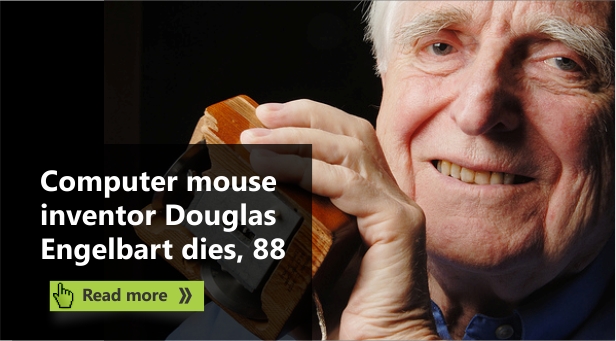Computer mouse creator Engelbart dies, aged 88
Doug Engelbart, the inventor of the computer mouse and developer of early incarnations of email, word processing programmes and the internet, has died at the age of 88.
He died from acute kidney failure at his California home after a long battle with Alzheimer’s disease, said one of his daughters, Diana Engelbart Mangan.
Back in the 1950s and ’60s, when mainframe computers took up entire rooms and were fed data on punch cards, Portland, Oregon-born Engelbart was envisioning a world in which people used computers to share ideas about solving problems.
He said his work was all about “augmenting human intellect”, but it boiled down to making computers user-friendly. One of the biggest advances was the mouse, which he developed in the 1960s and patented in 1970.
At the time, it was a wooden shell covering two metal wheels: an “X-Y position indicator for a display system”. The notion of operating the inside of a computer with a tool on the outside was way ahead of its time. The mouse was not commercially available until 1984, with Apple’s new Macintosh.
In fact, Engelbart’s invention was so early that he and his colleagues did not profit much from it. The patent had a 17-year life span, and in 1987 the technology fell into the public domain. At least one billion have been sold since the mid-1980s.
Among Engelbart’s other key developments, along with colleagues at Stanford Research Institute and his own lab, the Augmentation Research Centre, was the use of multiple windows. His lab also helped develop ARPANet, the government research network which led to the internet.
Engelbart dazzled the industry at a San Francisco computer conference in 1968. Working from his house with a home-made modem, he used his lab’s elaborate new online system to illustrate his ideas to the audience, while his staff linked in from the lab. It was the first public demonstration of the mouse and video teleconferencing, and it prompted a standing ovation.
“Doug pioneered network computing technologies when it was not popular to do so,” Sun Microsystems’ then-chief executive, Scott McNealy, said in 1997.
In 1997, he won the most lucrative award for American inventors, the $500,000 Lemelson-MIT Prize. In 2000, President Bill Clinton bestowed him with the National Medal of Technology “for creating the foundations of personal computing”.
© Irish Examiner Ltd. All rights reserved










Dram
Its quite an eye opener to know about Engelbart…i never had any regard for the mouse.